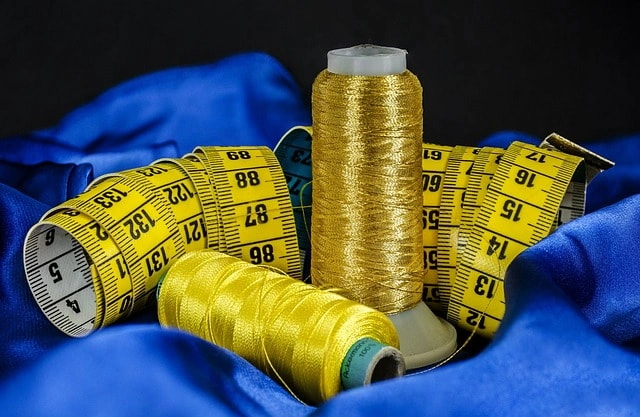Choosing the Right Cotton Thread for Your Textile Projects

Thread selection can make or break your craft projects. Whether you're a quilter, embroiderer, or garment maker, the type of cotton thread you choose plays a crucial role in the appearance, durability, and overall success of your creations. This guide will explore the different kinds of cotton threads, their specific properties, and which ones work best for various projects. By the end, you'll have a clearer understanding of how to match the perfect thread to your craft ambitions.
Understanding the Role of Cotton Thread
Cotton thread is a staple component in textile projects. It provides strength, flexibility, thread durability, and aesthetic value to your creations. But not all cotton threads are the same—different types are suited for different purposes. Selecting the wrong thread can result in uneven stitching, fabric damage, or weak seams. On the other hand, choosing the right one ensures smooth, durable, and visually appealing results.

For craft enthusiasts, DIYers, and textile artists, understanding the nuances of cotton thread can elevate projects to the next level.
Why Cotton Threads?
Cotton threads are known for their natural composition, soft texture, excellent absorption of dyes, and ability to sew seamlessly into fabrics. They’re widely valued for their versatility, working beautifully across both hand-sewing and machine-stitching applications.
If you’re new to the market or considering an upgrade, here’s your complete guide to exploring the types of cotton threads.
Types of Cotton Threads for Different Crafts
Before jumping into specific types, it’s essential to note that cotton threads come in varying finishes, weights, and compositions. Both cotton and polyester core threads are popular choices due to their unique characteristics. Here’s a quick breakdown of the most common types:
1. 100% Cotton Thread
Properties:
This is pure cotton with no synthetic additions. It’s soft, sturdy, and has minimal stretch.
Best Uses:
-
Quilting
-
Patchwork
-
Decorative top-stitching
How to Identify:
Look for labels specifically stating “100% cotton.” This thread often has a slightly matte finish and can be machine-washable.
2. Cotton-Wrapped Polyester Thread
Properties:
This thread combines the natural fibers of cotton with the strength and flexibility of polyester at its core, providing high resistance to wear and tear. The cotton wrap offers a soft, fabric-friendly exterior while polyester ensures durability. This makes it ideal for high speed sewing, as it can withstand the demanding conditions without compromising seam integrity. Additionally, it offers high resistance to needle burn, reducing the likelihood of damage and the need for frequent repairs.
Best Uses:
-
General garment construction
-
Craft projects requiring a balance of strength and appearance
How to Identify:
Cotton-wrapped polyester threads often have a smooth feel and are typically labeled as “cotton/polyester blend” or “cotton-covered polyester thread.”
3. Mercerized Cotton Thread
Properties:
Mercerized cotton has been chemically treated to enhance its strength, sheen, and dye absorption.
Best Uses:
-
Fine embroidery
-
Decorative stitching on clothing
How to Identify:
Look for a noticeably shiny thread that’s marked as "mercerized." It will have a polished and luxurious appearance.
4. Glazed Cotton Thread
Properties:
This thread undergoes a waxing or polishing process to give it a stiff, smooth coating. It helps reduce tangling during heavy-duty sewing.
Best Uses:
-
Upholstery
-
Canvas work
-
Leather stitching
How to Identify:
Glazed cotton threads have a glossy, slightly rigid appearance and are tougher to the touch.
5. Quilting Cotton Thread
Properties:
Quilting cotton thread is often 100% cotton and specifically designed for quilting. It’s heat-resistant and strong enough to maintain tension over many layers of fabric, providing excellent heat resistance while retaining durability and strength.
Best Uses:
-
Quilting (both hand and machine)
-
Piecing patchwork
How to Identify:
Labeled specifically as “quilting thread,” this thread offers a thicker texture and is engineered for high-tension stitching.
6. Wrap Thread
Properties:
Wrap thread generally refers to threads used as a decorative wrap on designs or as support threads for fabric reinforcement. They can be made of cotton, polyester, or a blend of both.
Best Uses:
-
Adding aesthetic appeal to decorative pieces
-
Reinforcing layers in crafting
How to Identify:
These threads often feature textured wraps and are reserved for specific craft applications.
___
Tips for Choosing the Right Cotton Thread

Now that you’re familiar with the different types, here’s how to choose the thread that’s most suitable for your next project.
-
Consider Your Fabric:
Match the thread’s weight and texture to your fabric. For lightweight fabrics, opt for thinner threads such as mercerized cotton. Heavier fabrics like denim or canvas require stronger threads, such as glazed cotton or cotton-wrapped polyester, which offer superior abrasion resistance.
-
Select the Right Color:
Choose a thread color that either complements or contrasts your fabric. Neutral tones like white, beige, or gray are ideal for blending, while bold hues add creative contrast.
-
Think About the Stitch Purpose:
For decorative stitching, go for mercerized or quilting cottons for a visually striking outcome. For hidden or strong seams, cotton-wrapped polyester thread works well.
-
Test Before Sewing:
If you’re machine stitching, always run a quick test on a scrap piece of fabric to ensure smooth threading and proper tension.
-
Check for Compatibility:
Ensure your selected thread is suitable for your sewing machine, especially for specialized threads like glazed or quilting cotton.
Inspirational Project Ideas
Need some inspiration? Here are a few creative ways to use different cotton threads:
-
100% Cotton Thread for hand-sewn mini quilts or fabric bookmarks.
-
Mercerized Cotton Thread for creating intricate floral embroidery patterns.
-
Cotton-Wrapped Polyester Thread for crafting everyday tote bags or clothing repairs while maintaining an authentic look.
-
Glazed Cotton Thread for making heavy-duty aprons or tool organizers with great looks.
For a perfect match, consider how specific thread types can complement denim colors and styles, especially during the hemming process.
Explore, test, and refine your thread choices to unlock endless possibilities for creative expression.
The Key to Perfect Results
Whether you’re quilting an heirloom, embroidering a statement piece, or constructing everyday garments, the thread you choose influences the final product. By understanding the properties of different cotton threads—and using them intentionally—you'll optimize the quality, durability, and overall appeal of your textile projects.
Are you ready to explore the world of cotton threads? Share your favorite creations or challenges in the comments below. Engage with our community of artists, and don’t forget to experiment with different types of threads to find what works best for you.
Happy crafting!
Related Topics
- Why Threads Cotton Make a World of Difference in Sewing
- Discover the Excellence of Gutermann Cotton Thread: Natural Solids 876 yd
- How is Cotton Thread Made? From Field to Fabric: Mastering the Craft
- Cotton Thread Types: Exploring the World of Cotton Threads for Sewing Enthusiasts
- The Essential Guide to Cotton Overlock Thread for Sewing Enthusiasts and Textile Professionals
- The Ultimate Guide to Cotton Thick Thread: Heavy Duty for Quilters and Sewing Enthusiasts
- Cotton Thread Size 5: Crafting Brilliance with the Top 100 Pearl Bundle
- Mastering the Art of Quilting with Mettler 60 Weight Cotton Thread
- Mastering Sashiko Embroidery with White Thick Thread for Stunning Results
